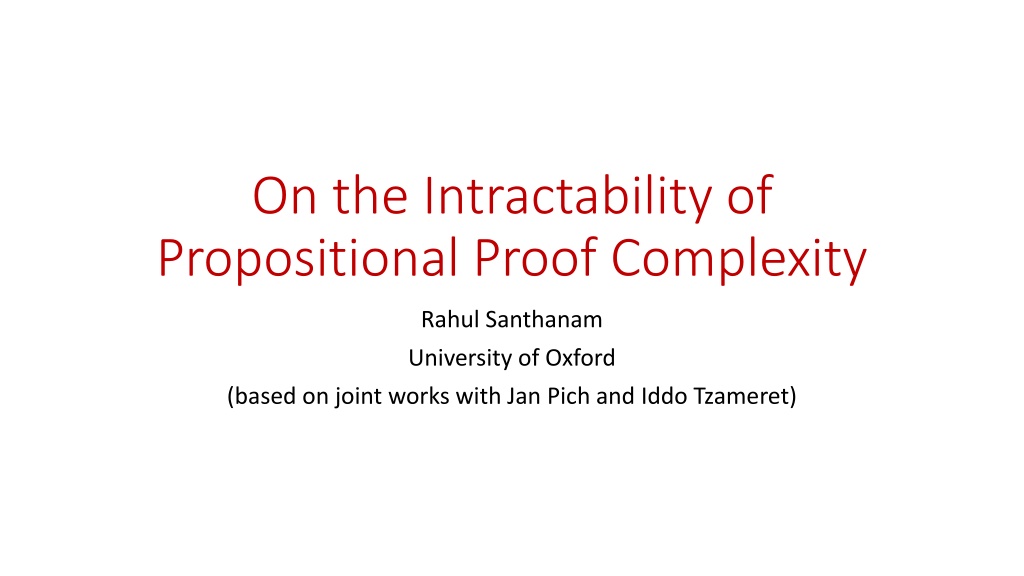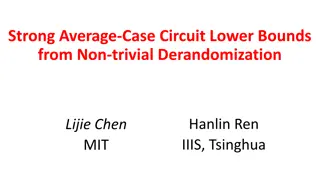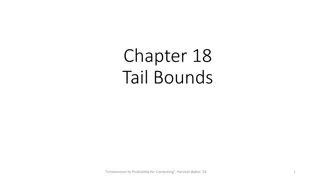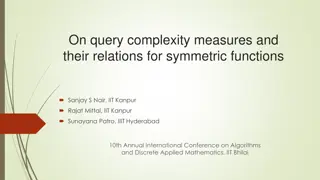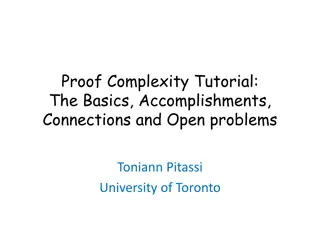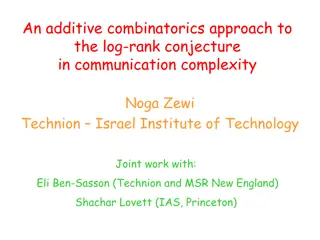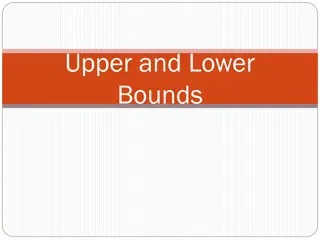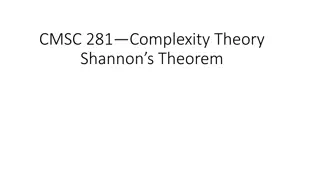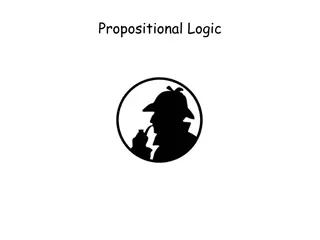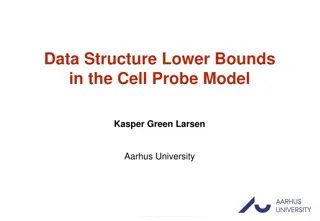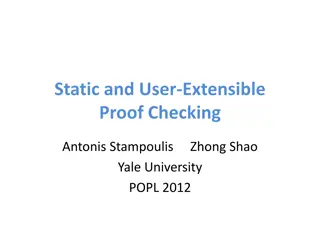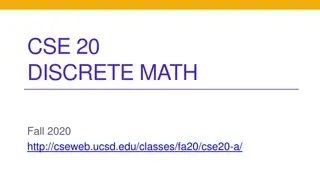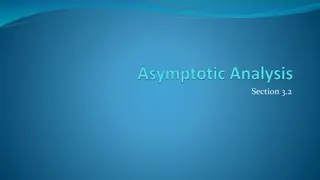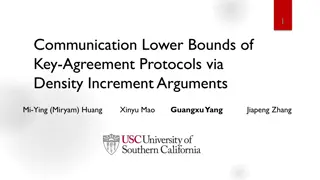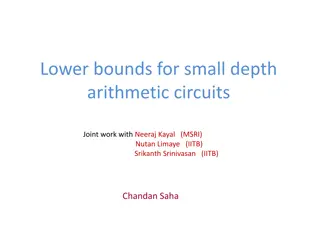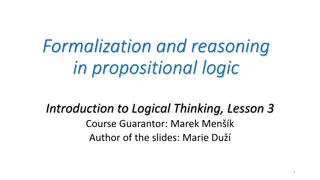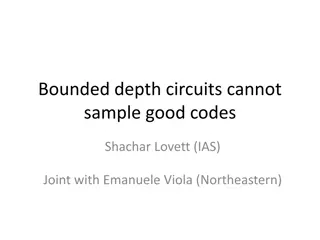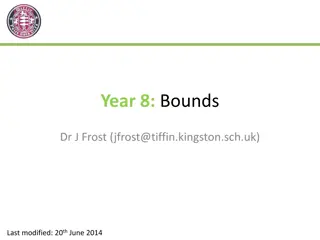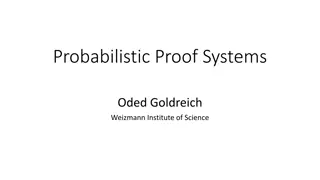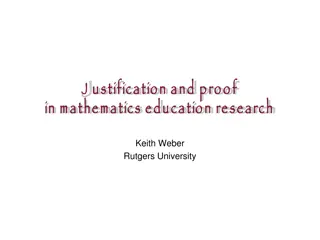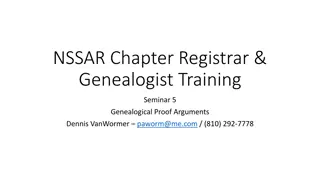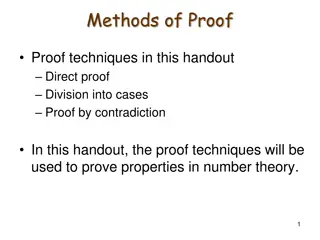Understanding Propositional Proof Complexity and Lower Bounds
Studies focus on the intractability of propositional proof complexity, exploring the power of proof systems to verify tautologies. Discussion on known lower bounds and challenges in proving hardness of certain tautologies.
Download Presentation

Please find below an Image/Link to download the presentation.
The content on the website is provided AS IS for your information and personal use only. It may not be sold, licensed, or shared on other websites without obtaining consent from the author. Download presentation by click this link. If you encounter any issues during the download, it is possible that the publisher has removed the file from their server.
E N D
Presentation Transcript
On the Intractability of Propositional Proof Complexity Rahul Santhanam University of Oxford (based on joint works with Jan Pich and Iddo Tzameret)
Motivation One of the main reasons we believe in complexity conjectures such as NP P and NP coNP is that very different algorithmic approaches to problems such as SAT have failed, indicating that there is a fundamental hardness phenomenon In a similar way, very different approaches to proving complexity conjectures have failed perhaps this indicates a fundamental meta- mathematical hardness phenomenon? This has been investigated in the context of circuit complexity lower bounds (via approaches such as relativization [BGS75] and natural proofs [RR97]) but not in the context of proof complexity lower bounds I will discuss two recent works [PS19, ST21] that address this gap
What is Propositional Proof Complexity? Studies the power of propositional proof systems (pps) to prove propositional tautologies (TAUT) A pps (resp. non-uniform pps) R is a poly-time (resp. poly-size) computable binary relation s.t. y R( ,y) iff TAUT An R-proof of a tautology is a string y such that R( ,y) holds. The R- proofsize of is the smallest size of an R-proof of We seek to understand, for various ppses R and natural families of tautologies { n}, how R-proofsize( n) grows with | n|
What is Known about Proof Complexity Lower Bounds? Super-polynomial lower bounds are known only for relatively weak ppses Haken [H85] showed lower bounds on Resolution proofs of the Pigeonhole Principle Ajtai [A94] showed lower bounds on AC0-Frege proofs of the Pigeonhole Principle No non-trivial lower bounds are known for the Frege or Extended Frege ppses On the one hand, proof complexity lower bounds have historically been harder to show than circuit complexity lower bounds On the other hand, there is almost no work on formally justifying their difficulty Question: Are there tautologies which we believe to be hard but for which it is hard to prove that they are hard?
Which Tautologies are Believed to be Hard? Can we find a sequence of poly-time constructible tautologies { n}, | n| = n, such that { n} is hard for every pps R? No! We can define a pps R which simply computes the sequence for itself, exploiting poly-time constructibility, and accepts all such tautologies with proofs of size zero Moral: We should use randomness when generating hard instances Candidate Hard distributions Random k-DNFs with n clauses, for large enough Random circuit lower bound tautologies, expressing that a random Boolean function does not have small Boolean circuits
Meta-mathematics of Proof Complexity For candidate hard distributions, formalize and study the question of whether proof complexity lower bounds for formulas sampled from this distributions are hard to show
The Main Results of [PS19]: An Informal Statement In the results below, candidate hard instances = random circuit lb tautologies Conditional Result: If candidate hard instances are hard for every non- uniform pps, then there is a pps R for which R-proofsize lower bounds on candidate hard instances are hard to prove (for every non-uniform pps) Unconditional Result: There is a non-uniform pps R for which R-proofsize lower bounds on candidate hard instances are hard to prove (for every non-uniform pps) Proof by win-win argument: If assumption of Conditional Result holds, we can apply the result to get our conclusion. If not, then consider the non-uniform pps R for which candidate instances are not hard. For this R, lower bound proofs do not exist, and hence conclusion holds
Formalization: Circuit Lower Bound Tautologies Let F be a Boolean function on n variables given by its truth table, and s be a size bound tt(F,s) is a propositional tautology stating that for all circuits C of size s, C does not compute F This can be expressed as a DNF of size O(2npoly(s)), which is the disjunction of 2nDNFs x, one for each x {0,1}n, where xexpresses C(x) F(x) Propositional variables encode the circuit C By random circuit lb tautologies , we just mean tt(F,s) for uniformly chosen F, with s chosen to be some large enough polynomial in n
Rudichs Conjecture Rudich [R97] conjectured that random circuit lb tautologies are hard for every non-uniform pps Rudich s Conjecture: There is an integer d such that for every non- uniform pps R, for all large enough n, whp over F uniformly chosen from n-bit Boolean functions, tt(F, nd) does not have poly-size R- proofs
Formalization: Meta-mathematics of Proof Complexity How do we formalize the notion that a proof complexity lower bound is hard to prove? It is natural to use the meta-mathematical interpretation of ppses, and insist that the proof complexity lower bound, appropriately formalized, is itself provable in some pps Indeed, known proof complexity lower bounds such as those for Resolution and AC0-Frege have short proofs in the Extended Frege proof system when appropriately formalized [CP90, BPU92]
Formalization: Proof Complexity Lower Bound Formulas Given a pps R, a propositional formula and a size bound t, R-pflb( ,t) is a propositional formula asserting that does not have R-proofs of size t This can be expressed as a DNF of size poly(| |+t), where the propositional variables encode a candidate R-proof of of size t, and the DNF encodes a simulation of the verifier for R to check that the candidate proof is invalid Similar formalization for non-uniform pps R
Formal Statement of Main Results of [PS19] Theorem 1: If Rudich s Conjecture holds, then there is a constant d and a pps R such that for every non-uniform pps Q, with high probability over choice of F, R-pflb(tt(F,nd), md) does not have poly-size Q-proofs (where m = |tt(F,nd)|) Theorem 2: If Rudich s Conjecture holds, then there is a constant d and a pps R such that for every non-uniform pps Q, with high probability over choice of random k-DNF , R-pflb( , md) does not have poly-size Q-proofs (where m = | |) Theorem 3 (Unconditional Result): There is a non-uniform pps R such that for every non-uniform pps Q, with high probability over choice of F, R-pflb(tt(F,nd), md) does not have poly-size Q-proofs (where m = |tt(F,nd)|)
Perspective: Circuit Complexity vs Proof Complexity There are few direct connections between circuit complexity and proof complexity, but there are various similarities There is a rough analogy between proving circuit lower bounds for a circuit class C and proof complexity lower bounds for the system C-Frege where lines of the proof are circuits from C Some of the best proof complexity lower bounds, eg., for AC0-Frege, are inspired by circuit lower bound techniques Theorems 1 and 3 can be thought of as giving an analogue of the natural proofs barrier for proof complexity
Natural Proofs vs Our Results Natural Proofs Barrier [RR97] Our Results Rules out efficient algorithms for hardness of random Boolean functions Is conditional on the existence of one-way functions Applies even to restricted circuit classes such as TC0 Rule out efficient proofs for hardness of random tautologies Are unconditional Apply only to strong proof systems and not to systems such as EF
Perspective: An Analogy with Gdels Theorem G del s famous Incompleteness Theorems [G31] First Incompleteness Theorem: Any strong enough consistent system of arithmetic is incomplete, i.e., there is a statement such that neither nor its negation can be proved within the system Second Incompleteness Theorem: No strong enough consistent system of arithmetic can prove its own consistency Are there analogues of G del s Theorems in the finitistic setting of propositional proof complexity? Natural analogues of the second incompleteness theorem don t hold: Any strong enough pps R has efficient proofs of R does not prove a contradiction within n steps [P86]
Finitizing Gdels First Incompleteness Theorem A natural finitary analogue would be: For any pps R, there are sequence of tautologies which do not have efficient R-proofs Main lower bound problem of propositional proof complexity Informally, proof of G del s first incompleteness theorem uses the self-referential sentence This sentence does not have an R-proof and shows that the sentence is R-unprovable Friedman [F75] and Pudlak [P86] explore how to finitize the proof of G del s First Incompleteness Theorem. This yields tautologies of size n that do not have R-proofs of size n for some > 0
Finitizing Gdels First Incompleteness Theorem A natural finitary analogue would be: For any pps R, there are sequence of tautologies which do not have short R-proofs Main lower bound problem of propositional proof complexity Informally, proof of G del s first incompleteness theorem uses the self- referential sentence This sentence does not have an R-proof and shows that the sentence is R-unprovable Our results show that for some non-uniform pps R and random tautologies , does not have efficient R-proofs does not have efficient R-proofs or even efficient Q-proofs for arbitrary non-uniform pps Q This looks stronger, but now it is unclear whether the corresponding statement are indeed tautologies
Other Analogues of Gdels Theorem? Is it true in general for strong enough pps R that R finds it hard to prove R-proofsize lower bounds?
Iterated Lower Bounds Hypothesis Given a pps R and a formula that does not have short R-proofs, define the iterated lower bound formulas as follows: 0 = n+1 = R-pflb( n, | n| (1)) Iterated Lower Bounds Hypothesis [ST21]: For any reasonable strong enough pps R, the sequence of formulas { n} is a sequence of hard tautologies for R We show that the Hypothesis holds for Resolution, by applying non- automatability results of [AM20, G19] , and show that a constant number of iterations preserves hardness for random truth table formulas for strong R, using ideas of [PS19]
Can the Ideal Proof System Prove Lower Bounds against Itself? Ideal Proof System (IPS) of Grochow and Pitassi [GP18] is an algebraic proof system where proofs are algebraic circuits witnessing that a set of polynomial equations has no common zero Theorem [ST21]: There is an explicit sequence of formulas n believed to be hard for IPS such that VNP VP iff IPS cannot efficiently prove lower bounds against itself for the formulas n This gives an equivalence between proof complexity lower bounds and algebraic complexity lower bounds Moreover, the equivalence works for any reasonable algebraic proof system at least as strong as IPS
[PS19] vs [ST21] Barrier of [ST21] Barrier of [PS19] Rules out efficient proofs for hardness of explicit formulas Is conditional on VNP VP Applies to the well-studied proof system IPS Rules out efficient proofsfor hardness of random tautologies Is unconditional Applies only to strong (non-constructive) proof systems and not to systems such as EF
Future Directions We ve focused on propositional proof complexity how about the setting of bounded arithmetic? [PS21] show unprovability of strong proof complexity lower bounds in PV but nothing is so far known about Buss s theory ?2 No evidence so far of intractability for standard proof systems such as Frege or Extended Frege. Can we show any intractability results for these systems under strong but still believable complexity assumptions? 1
Future Directions Parallel line of work by Krajicek, Oliveira and others on unprovability of circuit upper bounds [KO17, BKO20, MB20, CKKO20]. Can the two lines of work be combined to obtain independence results for natural complexity conjectures from not-too-weak theories of bounded arithmetic? Underlying the results presented in this talk is the fact that the doubled proof complexity lower bound operator R-pflb(R-pflb( )) is truth-preserving in various natural settings, eg., when applied to formulas encoding VNP VP for R=IPS. How widespread a phenomenon is this?
